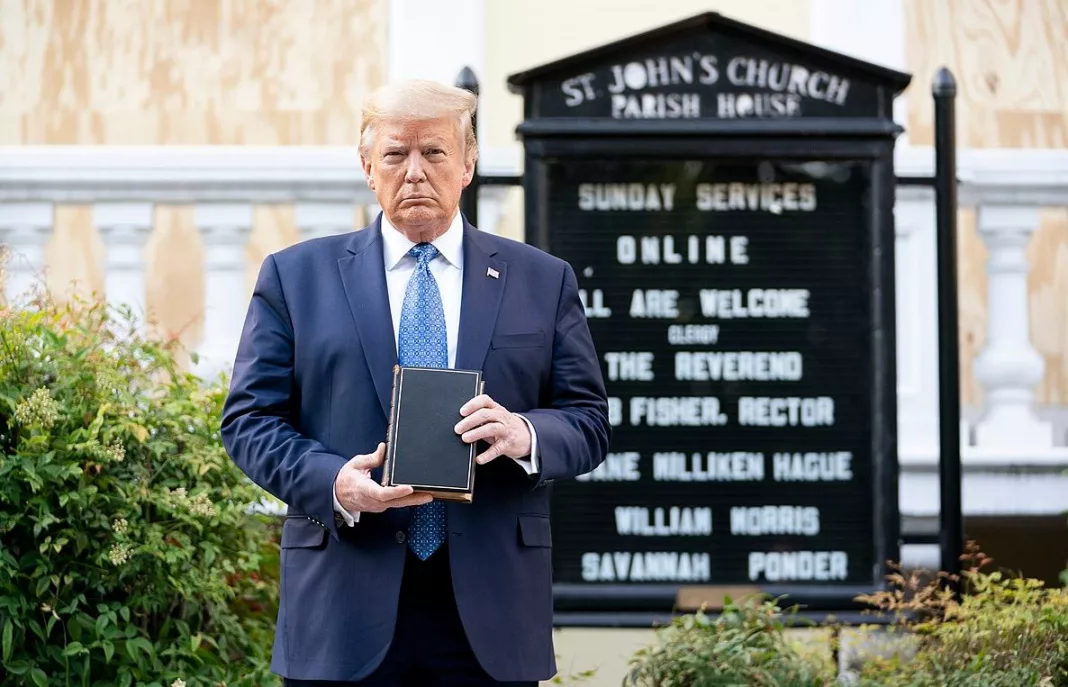The infamous image of Donald Trump standing, with a Bible, in front of St John’s Episcopal Church in Washington DC in June 2020, was the perfect embodiment of the 45th President’s commitment to reactionary politics in the midst of nationwide racial justice protests. Yet it also pointed to the importance of an often-overlooked component of Trump’s 2016 victory and the modern Republican party– white evangelicals – whose ultra-right-wing social policies have found an enthusiastic home in the GOP.
Crucially, while other constituent groups of Republican voters are motivated by a desire to ‘react’ against modernity or globalisation, the relationship between Trump and evangelicals demonstrates the extent to which the latter group has been transformed. That is, a modern American evangelical movement now seemingly prepared to put right-wing politics above all else, including, it seems, religious integrity.
In the man of Trump this trade-off becomes clear: as a twice-divorced, casino tycoon, his Christian credentials are severly lacking. But crucially, this was also the man who elevated Supreme Court justices in pursuit of an end to federal abortions, among other pro-Christian priorities. Evangelicals’ support for Trump has unsurprisingly been described as ‘largely transactional’. For both sides the opportunity provides a means to an end that involves shunning traditional Christian morality in the name of getting what they want.
But what is this end? It is the political opposition to what evangelicals perceive as a government persecuting them. Governor of California Gavin Newsom’s decision to shut down houses of worship during the Covid pandemic, for them represented the fulfilment of a government-led anti-church prophecy. This is the very idea that Trump invoked at a recent primary rally in Waterloo, Iowa, in which he cast Christians as a group persecuted by an administration “weaponized against them”.
This is but one strand of the ‘Make America Great Again’ philosophy; framed within the context of secular Democrats leading an anti-Christian inquisition, it assumes a particular potency for religious evangelicals. In this sense the GOP has quite literally been preaching to the choir. Yet in Trump seeking to link himself to evangelicals, it’s the so-called ‘nominal’ evangelicals who form the crucial contingent. The nomination of Trump as the 2016 GOP presidential candidate was in large part due to a new sort of evangelical voter; one for whom it is a political and cultural identity, rather than a reason to attend church or promote salvation.
It is in this discrepancy – where according to a 2023 HarrisX poll, Trump is seen as a ‘person of faith’ by more than half of Republicans despite his highly dubious moral record – that encapsulates the ‘politicisation’ of American evangelicalism. Non-attendance at church doesn’t stop evangelicals being guided in their voting by a deep sense of religious imperative. But, the motivation is more likely to come from the political doomsday predictions of David Barton, leader of the ‘American Restoration Tour’, rather than the moral lessons of the Bible.
Evangelicalism has historically emphasised the power of the individual to connect with God, without needing the church. But the correlation between irregular or non-churchgoers and support for Trump in the Republican primaries corresponds with Trump’s national ‘silent majority’. Those of which are formed of voters disconnected from and losing trust in civic institutions, which includes the local church.
Increasingly removed from churches, evangelicalism has become somewhat of a political identity which is synonymous with Trump and Trumpism. Studies such as the 2021 investigation by the Pew Research Centre demonstrates just how powerful this association has become. The study claims that those who were ‘warm’ to Trump were much more likely to convert to ‘evangelicalism’ during Trump’s presidency compared to those who did ‘not [feel] warm’ to him. Evangelicisms part in Reublican politics doesn’t simply lie in terms of voters, but we’re also increasingly witnessing evangelicals and Republican’s identity becoming more and more inseparable. It’s the most extreme believers who would put Christians in charge of the media and education system. And to achieve their goals, they’ve had to dance with the devil (figuratively and literally) to have any chance at political power.
Prominent figures in the evangelical movement have long sought to influence American politics and bring conservative social and religious policies into the mainstream: the 1950s saw the emergence of a ‘fundamentalist’ branch of political evangelicalism, embodied by men such as Jerry Falwell, who sought to oppose racial desegregation and ‘reclaim the nation’. By the 1970s this had evolved into the ‘New Christian Right’, which embraced Nixon’s call for ‘law and order’ and was central to Reagan’s 1980 election victory.
It was during this process, when the evangelicals came to dominate the Republican party, that its candidates were forced to sing from their conservative social and religious hymn sheet, that bound evangelical political fortunes so tightly with those of the GOP. Crucially, Trump has been able to mobilise the same fears of secularism that produced the fundamentalist movement, tying it to a prophecy of secular Democrat apocalypse, in an evangelical movement increasingly likely to prioritise political goals over religious tradition.
There isn’t a better indication of the future of evangelical Republicans aims to re-establish Christianity as the main driver of politics than that of a mid-seventeeth century England. The year 1653 saw the ‘Parliament of Saints’, an assembly of ‘godly men’ designed to accelerate the coming of Christ’s kingdom, which was the shortest political experiment after the civil war and led to Oliver Cromwell’s Protectorate.
It was an experiment in theocracy that failed miserably. In that case, the religious radicalism espoused by millenarian groups was sidelined, as Cromwell was forced to adapt to the political exigencies of ruling post-civil war England. Providing that America doesn’t just fall into a civil war, the danger with Trump is that he has proven himself to be bound by few, if any, such political or moral constraints. And, American evangelicalism is much the worse for it.


